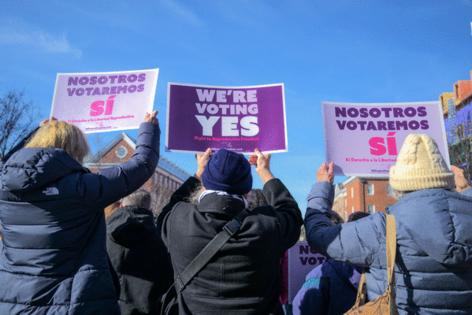Abortion rights group outraises opponents, spends big on ad campaign supporting Maryland ballot question
Published in Political News
BALTIMORE — Abortion rights advocates trying to drum up support for Maryland’s reproductive freedom ballot question have vastly outraised and outspent their opponents — pulling in more than five times the funds and unleashing a new $500,000 ad campaign three weeks before Election Day.
Backed by a hefty investment from Planned Parenthood and other large donations, the advocates raised more than $752,000 and spent $400,000 through early October with their organization, Freedom in Reproduction Maryland, according to new campaign finance reports released Friday.
“We’re not taking our foot off the gas. We’re not taking anything for granted,” said Erin Bradley, a Planned Parenthood leader who chairs the ballot issue committee.
For one of this year’s most motivating issues for voters, however, both sides have vowed to wage a robust campaign.
“We’ve got a little bit of everything to try to reach as many Marylanders as we can,” said Deborah Brocato, an anti-abortion lobbyist who leads Health Not Harm, a campaign committee that opposes the referendum and that had raised $139,000 and spent $99,000 by Oct. 6.
Posed as “Question 1” on ballots across the state, the referendum would amend the Maryland constitution to guarantee the “right to reproductive freedom,” including the right to an abortion. If approved, Maryland would join several other states that have moved to protect abortion access or not restrict it further since the U.S. Supreme Court overturned Roe v. Wade in 2022, reversing a half-century of precedent.
The clash in Maryland has, by all accounts, been considerably less intense than the last time abortion was on the ballot.
In 1992, voters approved codifying the protections of Roe v. Wade in state law, with 60% voting in favor. That result was not guaranteed, especially as some Democrats at the time were against abortion, and advocates on both sides of the ballot initiative nearly evenly split $3 million in combined fundraising and spending in the weeks before the election.
Maryland voters are unlikely to see that level of spending on the ballot issue this year — at least from the organizations primarily leading the charge. While candidates like Democratic U.S. Senate nominee Angela Alsobrooks focus prominently on the issue in their own multi-million-dollar campaigns, the advocacy groups for and against Question 1 know much has changed since 1992. Abortion access is widely popular in Maryland, and a poll last week from the University of Maryland, Baltimore County showed 69% of voters support the amendment.
“We’ve had a lot of momentum and its been really beautiful to see all of the groups” combining to promote the issue, Bradley said.
Bradley noted that while advocates in some states have spent tens of millions on similar efforts since the fall of Roe, it’s cost about $1 million in others. Though her organization reported raising nearly $750,000 through Oct. 6, fundraising has continued since then and will continue until the election, she said. The group’s campaign finance report, for instance, reported $400,000 in spending through Oct. 6 but that did not include the $500,000 in digital ads it launched this week.
“You can get the job done with a compelling narrative and hard work,” Bradley said. “That’s what we’re focused on.”
Brocato, of the opposing group, said Health Not Harm has also focused on digital and television ads as well as printed materials for more than 1,200 volunteers to hand out as they canvass the state.
“I’m amazed at all the volunteers,” Brocato said. “This has been selfless work because people really do care about each other.”
The group’s campaign finance reports showed $44,500 spent on media, including about $26,500 on online ads. Another $34,200 was spent on printed materials and $16,100 on yard signs.
About a quarter of its funding is from different Maryland chapters of Right to Life, an anti-abortion advocacy group. Of the less than 200 individuals who donated, 18 gave at least $1,000.
Another group opposing the amendment called Reproductive Trojan Horse had raised about $20,000, which was short of its $40,000 fundraising goal by the end of September, according to its website. The group, which did not respond to a request for comment, had spent only $1,075 by Oct. 6 but posted 30-second video ad on its website, where a brochure also quotes scripture and features an image of what appears to be a wolf dressed as a sheep.
For Freedom in Reproduction Maryland, more than $322,000 came from Planned Parenthood or its chapters and about 80 individuals donated at least $1,000. The largest individual donor was Nancy Hackerman, of the firm Hackerman Holdings Inc., who donated $35,000. Financial support also came from Democratic leaders’ political action committees, including Senate President Bill Ferguson, U.S. Rep. Jamie Raskin and U.S. Sen. Chris Van Hollen.
Van Hollen was one of several prominent officials who underscored the issue Friday in Baltimore, where about 75 women waved signs and cheered on Alsobrooks as she emphasized abortion rights in her campaign against Republican Larry Hogan.
Those and other types of advocacy efforts — like Archbishop William E. Lori sending a letter calling the amendment “both unnecessary and harmful” to more than 520,000 Catholic church members across Maryland — are not captured in the latest campaign filings.
For proponents of the amendment, that makes it all the more important to keep working in the final three weeks of the election, despite the already expected result.
“The polling is certainly optimistic, very hopeful,” Bradley said. “But we only realize those numbers when folks actually convert to action and show up to vote.”
---------
©2024 The Baltimore Sun. Visit at baltimoresun.com. Distributed by Tribune Content Agency, LLC.




























































Comments